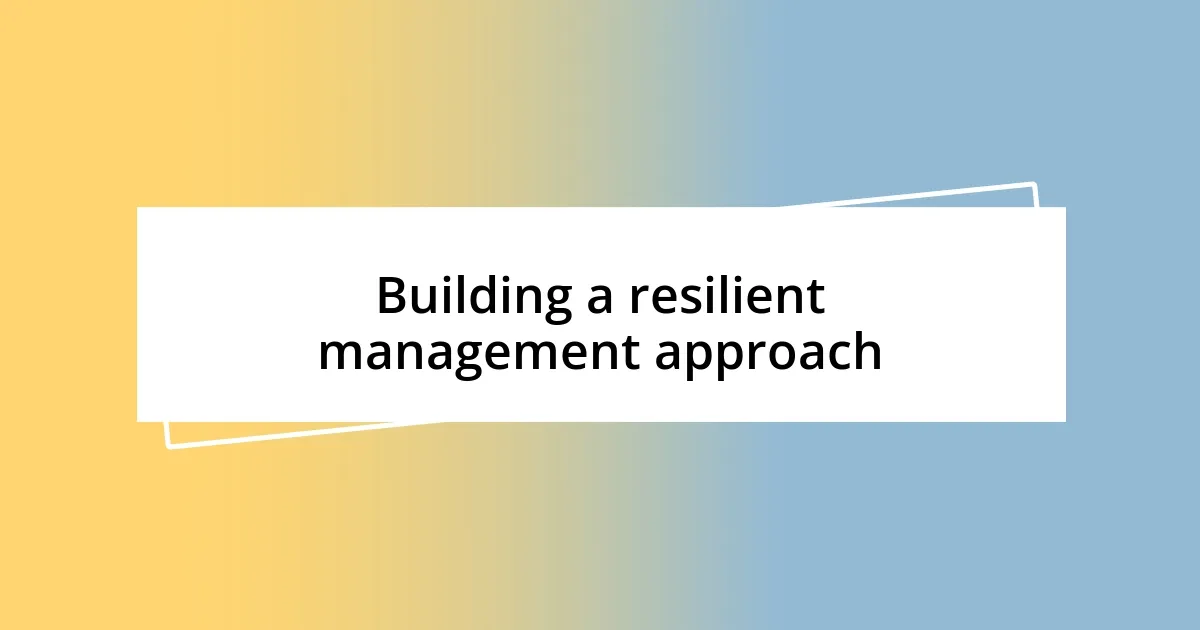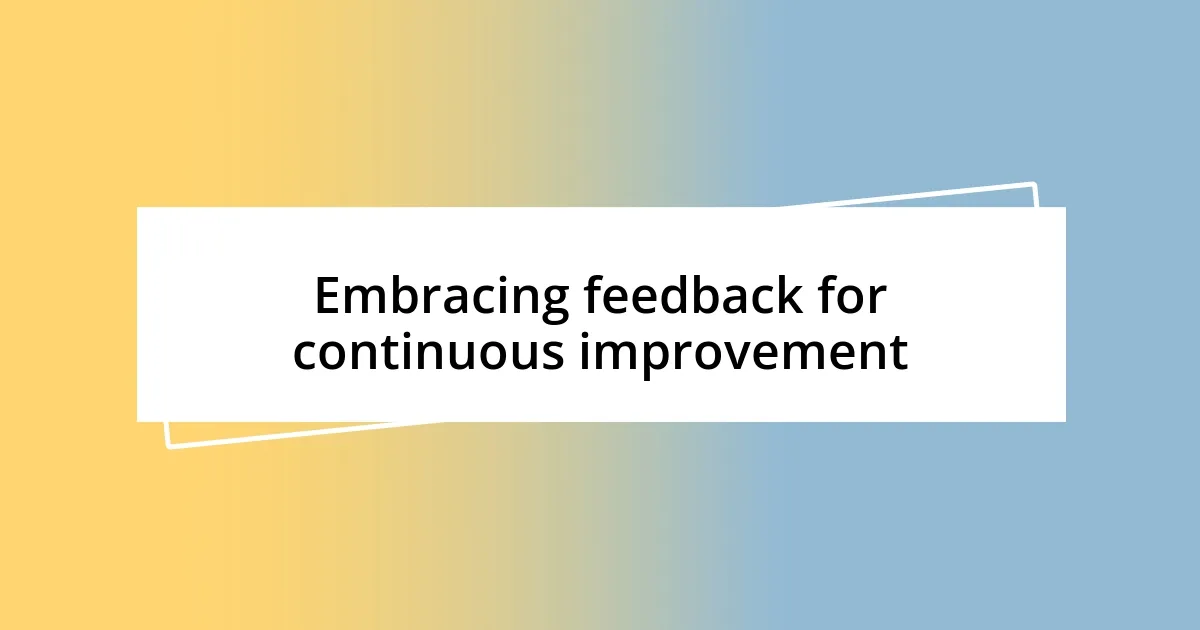Key takeaways:
- Management failures often stem from poor communication and failing to listen to team members, underscoring the importance of regular check-ins and feedback.
- Common pitfalls include micromanaging, neglecting personal development, and avoiding difficult conversations, which can hinder team effectiveness and morale.
- Embracing accountability, setting clear expectations, and practicing empathy are critical for building trust and enhancing team performance.
- Proactive measures like scenario planning and establishing clear communication channels can anticipate challenges and foster a supportive work environment.

Understanding management failures
Understanding management failures often means facing the uncomfortable truth that we’re not perfect. I vividly remember a project I spearheaded that went off the rails due to poor communication. It was a classic case of assumptions leading to confusion—had I really taken the time to check in with my team regularly, I wonder if we could have avoided that entire debacle.
Reflecting on my past missteps, I’ve come to realize that many management failures stem from not listening. For instance, during a critical phase in a project, I overlooked the concerns of a junior team member. Their insights could have steered us clear of a significant mistake, and that still stings when I think about it. Isn’t it fascinating how sometimes the best advice comes from the least experienced voices?
To truly understand management failures, I believe we must examine not just the outcomes but also the decision-making processes behind them. I often ask myself, “What led me to disregard certain warnings?” It’s a humbling experience that encourages growth. Recognizing that every failure is a stepping stone rather than a dead end reshapes my approach, guiding me to become more intentional in my leadership.

Identifying common pitfalls in management
Identifying common pitfalls in management requires a keen awareness of the tendencies that can derail even the most well-intentioned leaders. One major pitfall I’ve encountered is the tendency to micromanage. In one instance, I was so determined to keep everything on track during a launch that I hovered over my team’s every move. Instead of empowering them, I stifled creativity and disheartened those who were eager to take initiative. This experience taught me that trust in my team is paramount; delegation fosters innovation rather than just compliance.
Here’s a list of other common management pitfalls that I think we should be wary of:
- Ignoring team feedback: Dismissing input can create disengagement.
- Failing to set clear goals: Ambiguity leads to confusion and frustration.
- Neglecting personal development: A lack of focus on growth can stunt team potential.
- Avoiding difficult conversations: Skirting tough discussions often exacerbates issues.
- Overcommitting resources: Stretching a team too thin can result in burnout.
Each of these pitfalls presents unique challenges that can hinder a team’s efficiency and morale. In my journey, I’ve learned that addressing these issues head-on not only improves my management style but also strengthens my team as a whole.

Lessons learned from my experiences
Reflecting on my management journey, I’ve gathered quite a few lessons from my failures that have shaped who I am as a leader today. One significant realization was the importance of setting clear expectations. There was a time when I launched a project with vague guidelines, believing my team would intuitively understand the goals. This led to confusion and frustration, and I quickly learned that ambiguity can be more damaging than I had ever imagined. Setting clear milestones not only provides direction but creates a shared vision that unifies the team.
Another valuable lesson I internalized is the power of accountability. Early in my career, I found myself deflecting blame during team setbacks. I remember a project where we missed a deadline, and instead of taking responsibility, I pointed fingers at others. This approach compromised trust within the team. Over time, I recognized that embracing accountability fosters a culture of growth and resilience. Acknowledging my role in failures has transformed the dynamics in my teams, encouraging open dialogue and collective problem-solving.
Lastly, I’ve come to appreciate the role of empathy in leadership. In one instance, I was too focused on results and overlooked a team member struggling with personal challenges. Their drop in productivity was clear, but instead of asking how I could help, I pressed harder for outcomes. This experience was a wake-up call. I’ve since learned that understanding individual circumstances creates a supportive environment where everyone feels valued. Empathetic leadership not only enhances morale but boosts overall performance.
| Lesson | Importance |
|---|---|
| Setting Clear Expectations | Provides direction and prevents confusion |
| Embracing Accountability | Fosters trust and collective problem-solving |
| Practicing Empathy | Enhances morale and improves team performance |

Strategies to overcome management failures
To overcome management failures, I’ve found that cultivating open lines of communication is crucial. Early in my career, I was hesitant to invite feedback, fearing it would highlight my shortcomings. However, one day, I decided to hold a candid team meeting where everyone could voice their concerns. The relief in their faces was palpable; they finally felt heard. This experience taught me that encouraging dialogue not only fosters trust but also leads to innovative solutions to common challenges.
Another effective strategy is practicing self-reflection. I remember a time when a project went south, and my first instinct was to blame external factors. Instead, I took a step back and asked myself, “What could I have done differently?” This introspection revealed gaps in my planning and communication that I hadn’t acknowledged before. Recognizing my role in the outcome, whether positive or negative, has empowered me to grow and refine my approach continually.
Setting boundaries is a game-changer when it comes to managing workloads and expectations. I once found myself juggling multiple high-stakes projects, which stretched my team too thin. As deadlines loomed, I realized I had pushed everyone beyond their limits. By learning to say no and prioritize effectively, I’ve fostered a more sustainable work environment where team members can thrive. This not only prevents burnout but also instills a strong sense of purpose within the team. Isn’t it energizing to see your team performing at their best?

Building a resilient management approach
Building a resilient management approach requires adaptability. I recall a project where we faced an unexpected market shift. Initially, I felt overwhelmed, but then I gathered my team to brainstorm our next steps. I realized, in that moment, that flexibility in management allows us to pivot quickly and effectively. How many times have you found yourself in a similar situation? Embracing change not only helps navigate crises but fosters a culture of resilience among team members.
Another important aspect of resilience is creating a safe space for failure. I once managed a team where mistakes were met with harsh criticism. It created an atmosphere of fear, stifling creativity. After reflecting on this, I decided to encourage experimentation, explaining that failure is often a stepping stone to success. I watched as my team began to take calculated risks, leading to innovative solutions I hadn’t expected. Isn’t it liberating to think that failure can actually fuel growth?
The final piece of a resilient management strategy is engaging in continuous learning. I made a commitment to regularly seek out new knowledge and skills, whether through workshops or reading. I vividly remember attending a leadership conference where a speaker shared their management missteps openly. It reminded me that even the most successful leaders face challenges. This commitment not only sharpens my own abilities but inspires my team to do the same, fostering an environment of shared learning and growth. How often do we prioritize development over perfection? In my experience, it’s the key to resilience in management.

Embracing feedback for continuous improvement
Embracing feedback has been transformative for my management journey. I remember a pivotal moment when I initiated anonymous surveys to gather insights from my team. The results were startling, revealing perceptions I never considered. Initially, it stung a bit; however, this discomfort turned into motivation. I learned that constructive criticism is not an attack but rather a goldmine for growth. Don’t you think that the willingness to listen can reshape our leadership?
Furthermore, I started implementing regular one-on-one check-ins with team members. These sessions became a safe haven where they could express their thoughts without fear. One of my team members once shared how overwhelmed she felt with her workload. It was an eye-opener for me, prompting adjustments that not only alleviated her stress but improved overall team dynamics. If I hadn’t encouraged that feedback, would we have missed this opportunity for improvement?
In my experience, the greatest insights often come from the most unexpected places. I recall a project debrief where a junior staff member pointed out a flaw in our strategy. At first, I hesitated to accept feedback from someone less experienced, but his fresh perspective was invaluable. It taught me that title or tenure shouldn’t dictate who speaks up. Instead, fostering an inclusive feedback culture empowers everyone to contribute. And isn’t that the kind of environment we all want to work in?

Implementing proactive measures for success
Taking proactive measures is about anticipating challenges before they escalate. I recall a time when I shifted my focus from reactive problem-solving to proactive planning, specifically during a notable product launch. Instead of waiting for feedback after the launch, I involved my team in scenario planning sessions. By considering potential pitfalls early, we were able to develop contingency plans that ultimately saved us valuable time and resources. Isn’t it fascinating how foresight can transform a potential crisis into an opportunity?
Another proactive step is establishing clear communication channels within the team. I’ll never forget a project where unclear roles led to chaos and misalignment. By creating structured communication platforms, like weekly briefings and project management tools, team members became more accountable. This change also fostered a sense of ownership. Doesn’t having a clear direction and support from your peers make you feel more empowered at work?
I also found that setting measurable goals and milestones kept everyone focused and motivated. One project I led involved breaking down our main objective into smaller tasks with deadlines. This not only made the workload more manageable but also highlighted achievements along the way. Watching my team celebrate these small victories sparked a sense of camaraderie and drive that I hadn’t seen before. How often do we forget to acknowledge the journey while chasing the end goal? In my experience, these proactive measures lay the groundwork for sustained success.














